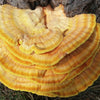Debunking the Top 5 Myths About Lion's Mane Mushroom Side Effects
Lion's Mane Mushroom Side Effects - Facts or Myth?

Ok so you’re thinking about trying Lion's Mane mushrooms? It's great to see so many folks getting curious about natural ways to boost their health. But along with that curiosity often comes a bit of worry, especially when we hear about lion's mane mushroom side effects. It’s totally normal to pause and think, “Wait a minute, what’s the catch?”
We're diving into a topic today that might seem a bit daunting at first—Lion's Mane Mushroom Side Effects. If you’ve ever Googled this and ended up more confused (and maybe a bit anxious), you're in good company. The internet has a knack for offering up the scary stuff, but that’s where we step in to sort the myths from the truth.
Rolling up our sleeves and doing a little homework on what we consume is super important, don’t you think? It makes us smart consumers, especially when it comes to something we’re adding into our wellness routine. So, let’s navigate this together, breaking down myths and uncovering facts about Lion's Mane. We're here to sift through the noise, bringing you reliable and clear-cut insights to help guide your choices. Ready to find out what’s really behind these side effects? Let’s get started!
Myth 1: Lion's Mane Mushroom Side Effects Include High Blood Pressure

What You Might Have Heard:
There's a whisper going around that taking Lion's Mane mushrooms could crank up your blood pressure. That sounds pretty worrying, right?
Let's Look at the Facts:
- No Ties to High Blood Pressure: So far, no studies have linked Lion's Mane mushrooms directly with increasing blood pressure. Quite the opposite, actually.
- Potential Perks: Some research even points to Lion's Mane having anti-inflammatory benefits, which might help in lowering blood pressure, not raising it.
Hearing It from the Experts:
- Health Pros Weigh In: Most doctors and health experts see Lion's Mane as safe, with zero evidence supporting the high blood pressure scare.
- Keep an Eye Out: It’s always smart to monitor yourself when you kick off any new supplement—just to see how your body reacts.
Smart Steps to Take:
- Ease Into It: If you're worried about blood pressure, maybe start with a smaller dosage. See how things go and adjust from there.
- Track Your Stats: If Lion's Mane is new on your radar, keep a casual eye on your blood pressure readings.
- Talk to Your Doc: When in doubt, it never hurts to chat with your healthcare provider, especially if you’ve got ongoing health issues.
Real Talk: That scary myth about Lion's Mane mushroom side effects pushing your blood pressure through the roof? Doesn’t seem to hold water. The evidence we’ve got actually suggests it could help keep your blood pressure in check. Still, always good to tune into what your body’s saying and get some advice from healthcare pros when needed.
Myth 2: Severe Allergic Reactions Are Common Lion's Mane Mushroom Side Effects

What You Might Have Heard: It’s said that Lion's Mane mushrooms can trigger severe allergic reactions in just about anyone who tries them. That certain sounds alarming, doesn’t it?
Let's Look at the Facts:
- Rare Occurrences: The truth is, severe allergic reactions to Lion's Mane are quite rare. Most people who use it don't experience any allergies at all.
- Typical Symptoms, If Any: Those who do have reactions might notice mild symptoms like itchiness or a mild rash, which are far from severe.
Hearing It from the Experts:
- Consensus from Medical Experts: Allergists and health experts usually find Lion's Mane to be low-risk when it comes to severe allergies.
- Listen to Your Body: Recognizing any small reactions early can prevent concerns from becoming bigger issues.
Smart Steps to Take:
- Patch Test: Before going all in, you might want to try a small amount on your skin to see how you react, especially if you're known to have sensitivities.
- Start with Smaller Doses: Likewise, ingesting a small amount initially can help gauge how your body handles it without overwhelming your system.
- Keep Antihistamines Handy: If you're worried about allergic reactions, having some antihistamines nearby could offer peace of mind.
Real Talk: While it's smart to stay alert about potential allergic reactions, the widespread fear that Lion's Mane mushroom typically causes severe allergies doesn't match up with the facts. Like with any new food or supplement, easing into it and watching how your body responds is the way to go. Most users enjoy all the benefits without any drawbacks, and you could too, as serious reactions are definitely not the norm.
Myth 3: Lion's Mane Mushroom Side Effects Lead to Liver Damage

What's Being Said: You might have stumbled across some alarming posts online claiming that taking Lion's Mane mushrooms could harm your liver. That sounds pretty serious, right? Let's dig into that and see what's really going on.
Here are the Facts:
- No Proof of Harm: There's actually no scientific evidence that links Lion's Mane mushrooms to liver damage. What's more, some studies point out that Lion’s Mane might even have protective effects on the liver.
- Supports, Doesn't Sabotage: Instead of causing harm, there's a good chance that Lion's Mane could help keep your liver in good shape by reducing inflammation.
Insights from the Experts:
- Liver Experts Weigh In: Liver specialists generally agree that there’s no substantial evidence to support the notion that Lion's Mane harms the liver. They actually consider it safe for most people.
- Always Good to Double-Check: Even with positive signs, if you're introducing anything new into your diet, being cautious and observant is essential—particularly if you have existing health concerns.
Steps You Can Take:
- Regular Health Checks: Keeping tabs on your liver health is wise and easy with routine blood tests, especially when you’re trying out a new supplement.
- Talk It Over with Your Doc: Bringing up Lion's Mane in your next doctor's visit can offer insights tailored to your health profile, especially if you've got liver issues.
- Choose Quality Products: Getting your Lion's Mane from trusted, reputable suppliers ensures you’re getting a pure, high-quality product without harmful additives that might affect your liver.
Straight Talk: While the internet can be a hotspot for scary claims, the fears about Lion's Mane mushroom leading to liver damage don't match up with the research. Chances are, it’s not just safe but potentially beneficial for your liver health. However, staying informed and cautious is your best bet. Always keep in communication with healthcare professionals and monitor how you feel—your body will thank you for that extra care!
Myth 4: Psychological Disturbances Are Lion's Mane Mushroom Side Effects

What's the Word on the Street: Ever hear someone mention that Lion's Mane mushrooms could send you on an unexpected mental trip or cause psychological disturbances? It's a topic that definitely catches attention but let’s see what’s really behind this claim.
Here are the Facts:
- Boost, Not Bust: Lion's Mane is actually celebrated for its cognitive-enhancing effects, including better focus and memory. There's no credible evidence suggesting it causes harmful psychological effects.
- Supportive, Not Scary: Many users report feeling clearer and more mentally balanced after using Lion's Mane, thanks to its nerve-growth and brain-supporting properties.
Insights from the Experts:
- Mental Health Professionals’ Take: Psychologists and neurologists who have studied Lion's Mane don’t find it linked to any adverse psychological effects. Instead, many recommend it for boosting cognitive health.
- Notice the Changes: It’s always recommended to be aware of how new supplements affect your mental state, but with Lion's Mane, the changes are generally positive.
Steps You Can Take:
- Start Gradually: If you’re concerned about how Lion's Mane might affect you mentally, start with a smaller dose to monitor its effects.
- Keep a Journal: Document any noticeable changes in your cognitive functions or mental state to track both improvements and unwanted changes.
- Consult Professionals: Discussing your supplement use with a mental health professional provides another layer of reassurance and personal guidance.
Straight Talk: The notion that Lion's Mane mushrooms cause psychological disturbances is more myth than fact. What many users experience instead is an uplift in their cognitive functions and mental clarity. Like with any supplement, it’s smart to start small and see how your body and mind respond, but you’ll likely find that Lion's Mane is a supportive friend to your brain, not a foe.
Myth 5: Addiction is a Major Side Effect of Lion's Mane Mushroom

What’s Floating Around: There’s a whisper in the wellness world that maybe, just maybe, Lion’s Mane mushroom could be addictive. That sounds pretty serious, and definitely something we should talk through together.
Let’s Break It Down:
- Not on the Addictive List: First off, Lion’s Mane doesn’t contain any addictive substances. It’s a mushroom, not a drug, and it’s used primarily for its health benefits, not for any kind of ‘high’.
- Healthy Routine, Not a Dependency: Incorporating Lion’s Mane into your wellness routine is just like adding a daily vitamin or going for a morning jog—it’s about enhancing your life, not a dependency you can’t shake.
From the Experts’ Corner:
- Doctors Weigh In: Health experts are clear on this—Lion’s Mane doesn’t have addictive properties. It’s viewed as safe and non-habit forming from a medical standpoint.
- Usage Tips: As always, sticking to recommended doses is a good idea, just to keep everything in healthy moderation.
Smart Moves To Make:
- Stick to the Script: Follow the suggested dosage on your Lion’s Mane product. It’s there to help you get the benefits without going overboard.
- Reflect on Your Usage: Keep an eye on why you’re enjoying Lion’s Mane. Is it helping you feel more focused? Great! Just ensure it remains a choice, not a craving.
- Chat with Your Doc: If you’ve got worries about how you’re using any supplement, a quick chat with your healthcare provider can set your mind at ease.
Real Talk: The idea that you might get addicted to Lion's Mane mushroom is more fiction than fact. Everyone loves a good health boost, and it’s cool to see the benefits this mushroom can bring. Remember, like any good thing, moderation is key. So, enjoy the perks of Lion’s Mane with peace of mind: addiction isn’t part of the package.
Conclusion to Lion's Mane Mushroom Side Effects

Well, we’ve certainly had a myth-busting session today! We've taken the time to sift through some of the buzz and worries about Lion's Mane Mushroom Side Effects. It turns out that many of those scary stories are more about fear than actual fact. From concerns about high blood pressure and severe allergic reactions to fears of liver damage, psychological issues, and even addiction—when we really dive into the research, Lion’s Mane comes out looking pretty good.
It's always smart to be a bit cautious and curious when you’re introducing something new into your wellness routine. Researching, starting small, and talking things over with your doctor are always wise steps to take. It’s all about making sure you’re taking care of yourself in the best way possible.
If you've been on the fence about trying Lion's Mane because of something worrying you heard, I hope we've cleared the air for you. With these myths out of the way, you might discover that Lion's Mane is just what you need for a little mental boost. So why not try it out with a fresh perspective and see how it goes? Here’s to stepping forward confidently and taking charge of your health, armed with good information and a readiness to feel your best! See our collection for One Mind, lion's mane supplement supporting wellness and brain health.
Frequently Asked Questions About Lion's Mane Mushroom Side Effects

Can Lion’s Mane mushroom really increase blood pressure?
Not at all! There's actually no link between Lion's Mane and high blood pressure. If anything, it might help keep your blood pressure in check because of its anti-inflammatory properties. It's one of those natural wonders that could be more helpful than you'd expect!
Is it common to have allergic reactions to Lion’s Mane mushrooms?
Hardly! Severe allergic reactions to Lion’s Mane are quite unusual. Most folks try it with no trouble at all. But, if you're someone who tends to have allergic reactions, perhaps start with a small amount – just to be safe and see how it goes from there.
Could taking Lion’s Mane lead to liver damage?
Nope, that’s another myth busted! Lion's Mane doesn't harm the liver. In fact, studies suggest it could actually be beneficial, helping to reduce inflammation which is good news for your liver's health.
Are there psychological disturbances associated with consuming Lion’s Mane?
No worries here—the mushroom is known more for clearing the fog than causing any trouble. People often use Lion's Mane to enhance their focus and brain power. It’s all about boosting mental performance, not disrupting it.
Is Lion’s Mane mushroom addictive?
Absolutely not. Lion’s Mane is a natural health booster without any addictive properties. It's like adding spinach to your diet – good for you, but not something you crave or become dependent on. It’s taken more for its brain and health benefits, leaving dependency out of the picture.




